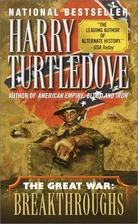| Flora Blackford | |
| Fictional Character | |
| Southern Victory POD: September 10, 1862 | |
| Appearance(s): | American Front through In at the Death |
| Type of Appearance: | Direct POV |
| Nationality: | United States |
| Religion: | Judaism |
| Occupation: | Politician |
| Parents: | Benjamin and Sarah Hamburger |
| Spouse: | Hosea Blackford |
| Children: | Joshua Blackford |
| Relatives: | David Hamburger (brothers)
Yossel Reisen, Jr. (nephew) |
Flora Hamburger Blackford was one of the United States' most storied politicians. She served in the Congress during both the Great War and the Second Great War, with a period as the First Lady between the war. A Socialist firebrand in the youth, she came to be known as the "Conscience of the Congress". She strove for social justice at home and abroad, often decrying against U.S. militarism and expansionism during and after the Great War, but growing more pragmatic in the face of the Second Great War.
Early Career
Flora was born the second of five children to her Jewish parents, Benjamin and Sarah Hamburger. She began her political career in 1914 as a Socialist Party grassroots activist and agitator in a working-class Jewish neighborhood of New York City. She opposed the party-leadership's decision to vote credits for the just-started Great War.
In 1916 (at that time, women still couldn't vote in most of the United States), Hamburger made the daring decision to run for her district's Congressional seat and won, becoming one of only two women in the House of Representatives (the other was a woman from Pennsylvania who had assumed her late husband's seat). On arrival in Philadelphia, Flora was welcomed by the experienced and far older Socialist Congressman Hosea Blackford of Dakota. Their relationship eventually blossomed into a love affair.
In no time Flora earned the reputation of "Conscience of the Congress" for her frequent and eloquent pleas to her colleagues to consider the ethical implications of how the country conducted the Great War. She signaled her capacity for activism even from her basically minor position as a junior member of the House Transportation Committee when she grilled General Leonard Wood about the War Department's barrel policy. From there, Hamburger opposed the repression of the Mormons of Utah, and she vainly attempted turn the attention of US public to the plight of blacks in the Confederate States. She even refused an offer by General Wood to have her brother, David, transferred out of the front line. David lost a leg in battle, a fact which haunted Flora for the rest of her life.
Flora's reputation was such that in 1917, when the Entente powers were falling out of the war and the Confederacy's days appeared numbered that Confederate President Gabriel Semmes sent an agent to Flora with a proposal for peace. She brought that proposal to U.S. President Theodore Roosevelt, who gleefully rebuffed the relatively soft terms.
The Interwar Years and First Lady
After the U.S. won the Great War, the political winds of the country changed. In 1918, for the first time ever, the Socialist party became the majority party in Congress. In the meantime, Flora and Hosea Blackford had developed a deeply committed and loving relationship. At the 1920 Socialist convention, Upton Sinclair became the party's nominee for the presidency. Sinclair offered Hosea Blackford the vice-presidency, which Blackford accepted. Then Blackford in turn proposed marriage to Flora, who accepted. Their marriage would last 17 years, and produced a son, Joshua.
As the country did well under Sinclair, Blackford was handily elected President in 1928. Flora opted not to run for congress again to concentrate on her duties as First Lady. However, the stock market crash came in 1929, and as the economy spiraled into depression, Blackford's popularity fell. By 1932, the country was fighting the Pacific War against Japan, and Blackford's prospects of being re-elected looked grim. Flora realized that her husband's political career was over in 1932, when, while they were campaigning in Los Angeles, Japanese planes bombed the city. Democrat Calvin Coolidge defeated Blackford that November.
The Blackfords moved to Dakota. Retirement did not set well with Flora. She convinced her husband to return to New York with her so she could regain her congressional seat, which she did in 1934 in a hard-fought campaign. She became very alarmed by the political course the Confederacy was taking, as the Freedom Party had come to power and Jake Featherston was elected president. Flora was disturbed by the revanchist speeches Featherston was famous for, as well as his hard line on suppression of the rights of blacks. However, she could only watch helplessly as U.S. President Herbert Hoover (Coolidge died before his inauguration) vacillated on the Featherston issue.
Return to Congress and the Road to War
In the meantime, Hosea Blackford's health began to decline. While he lived to see the Socialists regain power and the election of Al Smith as president in 1936, Hosea Blackford died months after inauguration day, 1937. Flora grieved, and then threw herself into her work. She supported Smith's meeting with Featherston in Richmond, and the agreement that came from that meeting. She campaigned hard for Smith in 1940, and saw him re-elected. However, she was quickly disappointed as Featherston immediately violated as many terms of the Richmond Agreement as he could. When Smith finally took a hard stand against Featherston, Flora applauded the decision. She was in Philidelphia when Confederate bombers attacked the city in the advance of Operation Blackbeard.
The Second Great War and the Superbomb
As the Second Great War commenced, Flora discovered a peculiar budgetary item appropriating a large amount of money for a project in western Washington State. She brought this to Smith's attention, who referred her to Assistant Secretary of War Franklin D. Roosevelt, who explained that it was an atomic bomb after swearing her to secrecy. Flora agreed, but used this to strike a deal with Smith which forced the president to publicly condemn the Confederate atrocities against its blacks.
Flora was one of those who learned in 1942 that President Smith had been killed during a bombing raid. She watched Vice-president Charles W. La Follette's swearing in as president, and felt a growing hardness as in her worldview. Throughout 1942 and 1943, Blackford found herself agreeing more with Democratic Senator Robert Taft of Ohio about taking a hard line towards the Confederacy and towards the Mormons, who had once again rebelled. Although she'd previously been far more humanitarian in her views, the constant conflicts her country had to endure left her far less charitable to the country's enemies. She grew particularly vindictive with regards to the Mormons as they developed the tactic of people bombs, one of which claimed Taft's life.
While the U.S. had rallied in 1942 after the Battle of Pittsburgh and the C.S. was on the ropes by late 1943, Flora was nonetheless anguished to learn that her son had been drafted.
Blackford continued a relatively hard stance against the C.S. for the remainder of the war. She was vindicated by the revelation of the Population Reduction. She and Roosevelt talked frequently about the status of the uranium bomb, and both share a brief moment of horror when Imperial Germany used the first bomb against the Russian capital of Petrograd. Increased security saved Flora and the rest of Congress from the superbomb Confederate General Clarence Potter sought to detonate in Philadelphia. Flora and other members of Congress toured the site of the detonation.
In 1944, Flora was horrified to learn that Joshua had been injured. His injury turned out to be minor, the loss of the middle finger of his left hand.
Continuing her activist streak, Flora gave a speech congratulating Cassius Madison for killing Jake Featherston. She also made sure that Madison had an honest accountant to help manage the $100,000 the U.S. government gave him as a reward.
Despite President La Follette's success in defeating the C.S., the Socialist Party lost Congress and Presidency in the 1944 elections. Flora was re-elected by a strong majority (although one not as strong as in the previous election), one of the few Socialists to retain their seats.
See also
| Political offices (Southern Victory) | ||
|---|---|---|
| Preceded by Daniel Miller |
Congressional Representative for the Lower East Side of New York City 1917-1929 |
Succeeded by unknown |
| Preceded by unknown |
Congressional Representative of the Lower East Side of New York City 1935-19?? |
Succeeded by Incumbent at end of series |










